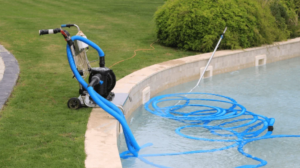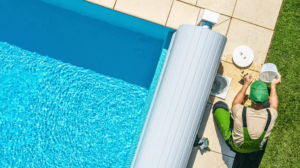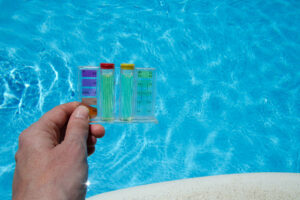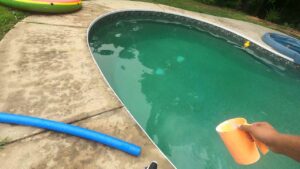Deciding to build a custom swimming pool is one of the most exciting investments you can make for your home. It’s more than just a place to cool off; it’s the future centerpiece of family gatherings, summer barbecues, and quiet relaxation. But before you can cannonball into your new oasis, you face a foundational decision: what will it be made of? The choice of pool materials is the single most important factor that will define your pool’s look, cost, and lifespan.
This guide is here to demystify the options. We’ll walk you through the three main types of in-ground pools—concrete, vinyl liner, and fiberglass—so you can make an informed decision that perfectly suits your vision, budget, and lifestyle here in Pennsylvania. By the end, you’ll understand the pros and cons of each and feel confident in choosing the right foundation for decades of backyard fun.
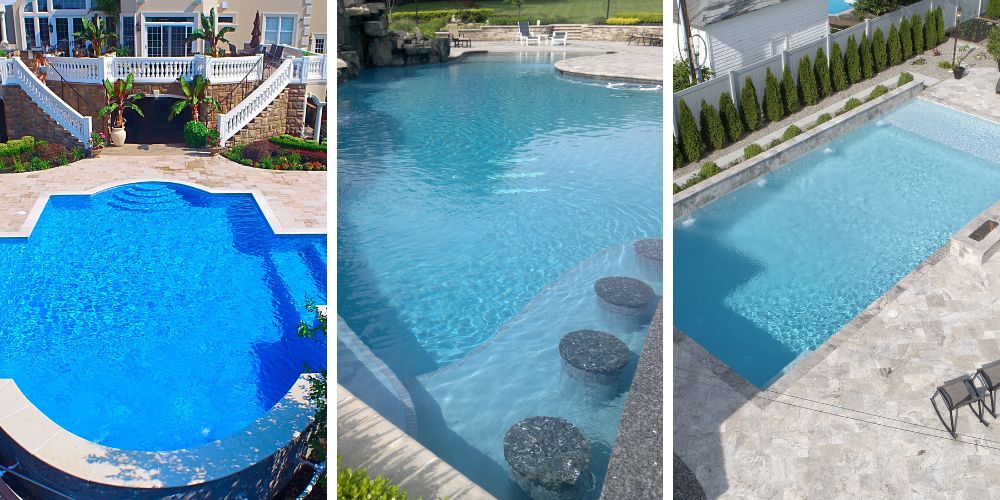
The Big Three: An Overview of Pool Materials
When it comes to in-ground swimming pools, the industry primarily revolves around three core materials. Each has a distinct construction process and unique set of characteristics.
- Concrete (Gunite/Shotcrete): The most customizable option, built on-site by spraying a concrete mixture over a steel-reinforced frame.
- Vinyl Liner: A popular budget-friendly choice where a custom-made sheet of vinyl is set into an excavated hole with a structural wall frame.
- Fiberglass: A pre-manufactured shell, created in a factory and delivered to your home to be set into place by a crane.
Let’s dive deeper into what makes each of these pool materials tick.
Concrete Pools: Unmatched Flexibility and Durability
At Poseidon’s Custom Pools, we specialize in concrete (or gunite) pools, and for good reason. They represent the gold standard in customization and permanence. If you can dream it, you can build it with concrete. This method allows for complete creative freedom.
The construction involves excavating the area, creating a grid of steel reinforcement bars (rebar), and then pneumatically applying a concrete and sand mixture. This shell is then troweled smooth and cured before an interior finish like plaster, aggregate, or tile is applied.
Pros of Concrete Pools
- Unlimited Design Freedom: From free-form lagoon shapes to sleek geometric designs with vanishing edges, concrete can be molded into any size or shape you desire.
- Extreme Durability: The steel-reinforced concrete shell is incredibly strong and built to last for decades, withstanding Pennsylvania’s seasonal changes.
- Aesthetic Versatility: The interior finish determines the final look. You can choose from classic white plaster, colorful and durable pebble aggregates, or luxurious all-tile surfaces.
Cons of Concrete Pools
- Higher Initial Investment: The custom labor and materials involved make it the most expensive option upfront.
- Longer Installation Time: A concrete pool build is a significant construction project, typically taking 8 to 12 weeks from start to finish.
- More Intensive Maintenance: The porous nature of plaster finishes requires more diligent chemical balancing to prevent algae growth. The surface also needs to be replastered every 10–15 years.
Vinyl Liner Pools: A Cost-Effective and Smooth Choice
Vinyl liner pools are the most common type of in-ground pool in the United States, largely due to their attractive price point. The construction process involves assembling wall panels (steel, aluminum, or polymer) on a concrete footing, laying a sand or grout base, and then fitting the heavy-grade vinyl liner.
The liner is what holds the water and gives the pool its interior look. Modern vinyl liners come in a vast array of colors and patterns, including designs that mimic the look of tile or stone.
Pros of Vinyl Liner Pools
- Lower Initial Cost: This is typically the most affordable way to get an in-ground pool.
- Smooth Surface: The non-porous vinyl is soft to the touch and less prone to algae growth than plaster.
- Quick Installation: Once the excavation is done, a vinyl pool can often be assembled and ready for water in one to three weeks.
Cons of Vinyl Liner Pools
- Liner Replacement: The biggest drawback is the liner’s lifespan. It will need to be replaced every 5 to 10 years, which is a recurring expense.
- Vulnerability to Damage: While durable, the liner can be punctured or torn by sharp objects, pets’ claws, or improper chemical use.
- Limited Customization: While you can choose from various shapes, you are generally limited to manufacturer-provided designs and cannot have the complex, integrated features that concrete allows.
Fiberglass Pools: Speed and Low Maintenance
Fiberglass pools are like a giant bathtub for your backyard. They are built off-site in a factory-controlled environment from multiple layers of fiberglass and resin around a mold. The finished shell, complete with steps and benches, is then transported to your property and lowered into a pre-dug hole.
This “plug-and-play” approach has made fiberglass a rapidly growing segment of the pool market. The smooth, non-porous surface, known as a gelcoat, is a key feature.
Pros of Fiberglass Pools
- Fastest Installation: This is the quickest way to get swimming. Installation can take as little as a few days once the shell arrives.
- Low Maintenance: The non-porous gelcoat is highly resistant to algae and staining, reducing the need for chemicals and scrubbing.
- Durability: The shell is flexible and strong, able to withstand ground movement without cracking.
Cons of Fiberglass Pools
- Limited Shapes and Sizes: You are restricted to the molds offered by the manufacturer. Designs are also limited in width to what can be legally transported on highways.
- Higher Upfront Cost: The initial price is typically higher than vinyl liner pools, though less than a custom concrete pool.
- Difficult Repairs: While damage is rare, significant repairs to the gelcoat can be complex and may not match the original finish perfectly.
At-a-Glance: Comparing Pool Materials
| Feature | Concrete (Gunite) | Vinyl Liner | Fiberglass |
| Initial Cost | High | Low | Medium |
| Installation Time | 8–12 weeks | 1–3 weeks | 3–7 days |
| Customization | Unlimited | Limited | Very Limited |
| Durability | Very High (decades) | Low (liner lasts 5-10 yrs) | High (shell lasts decades) |
| Maintenance | High | Medium | Low |
| Surface Feel | Can be rough | Smooth | Very Smooth |
Beyond the Shell: Choosing Your Pool’s Interior Finish
For concrete pools, the shell is just the beginning. The interior finish is what provides the final touch of beauty and texture. This is another area where your choice of pool materials truly shines.
- Plaster: The classic choice, a simple mixture of cement and marble dust that creates a timeless white or blue look. It’s affordable but requires the most maintenance.
- Aggregate Finishes: These have become the most popular choice for modern pools. By mixing small pebbles or quartz crystals into the plaster, you get a much more durable, stain-resistant, and visually interesting surface. The texture can range from slightly bumpy (pebble) to smooth (polished quartz).
- Tile: The most premium option, tile offers unmatched durability and artistry. From glass to porcelain, you can create intricate mosaics and designs that last a lifetime with minimal maintenance.
Which Pool Material is Right for Your Pennsylvania Home?
So, how do you choose? The best pool for your neighbor might not be the best pool for you. It comes down to three things: your vision, your budget, and your tolerance for maintenance.
- Choose Concrete if: You have a specific, unique design in mind that can’t be found in a catalog. You want a pool that is an architectural extension of your home and are planning for the ultimate long-term investment.
- Choose Vinyl Liner if: Your primary concern is the initial budget. You want to get a pool installed quickly for the summer and are comfortable with the recurring cost of replacing the liner down the road.
- Choose Fiberglass if: Low maintenance and speed are your top priorities. You find a pre-designed shape you love and want to spend more time swimming and less time scrubbing.
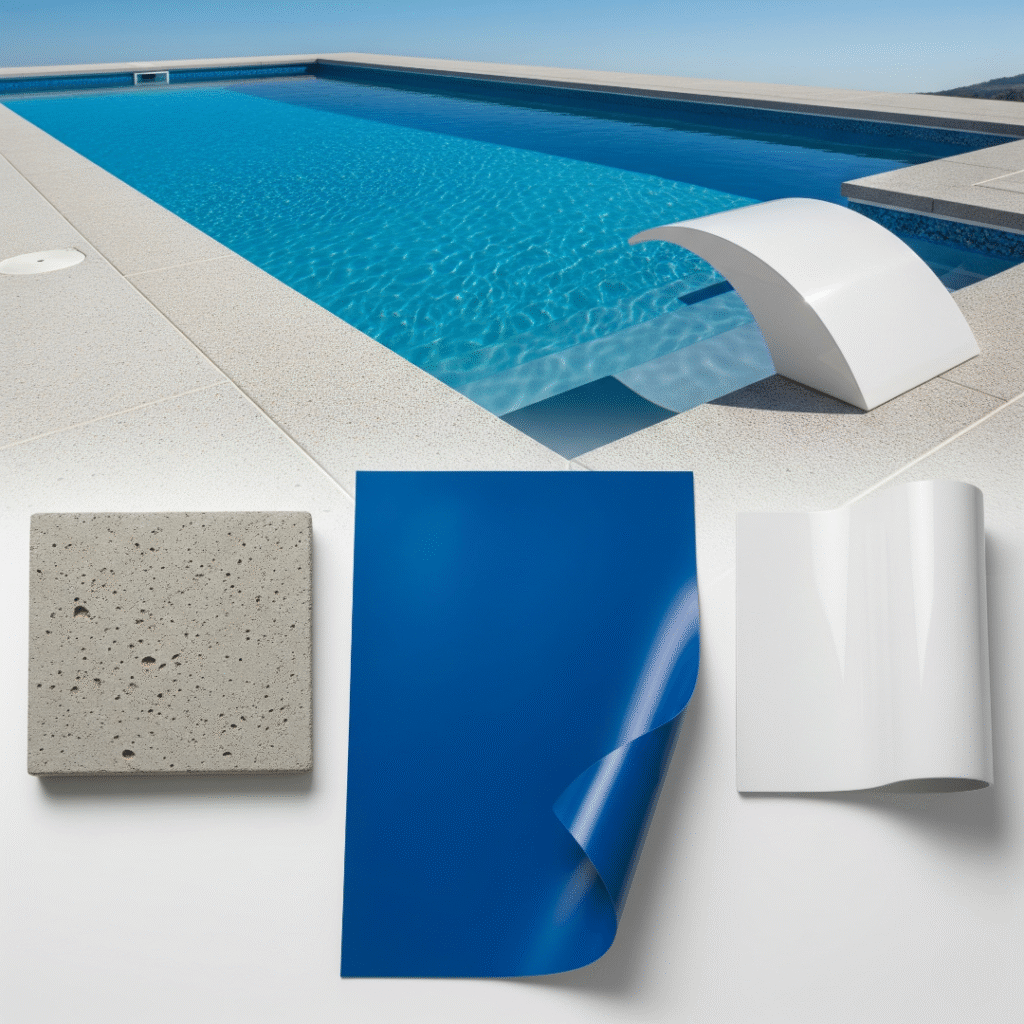
Let’s Build Your Dream
Choosing your pool materials is a foundational step, but you don’t have to take it alone. Understanding the differences between concrete, vinyl, and fiberglass empowers you to ask the right questions and invest wisely in your family’s happiness.
Ready to explore the limitless possibilities of a custom concrete pool for your Pennsylvania home? The expert team at Poseidon’s Custom Pools is here to guide you through every step, from design to the first swim. Contact us today for a consultation, and let’s start building the backyard of your dreams.

